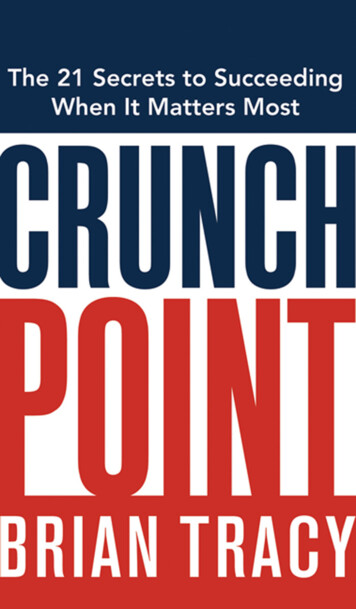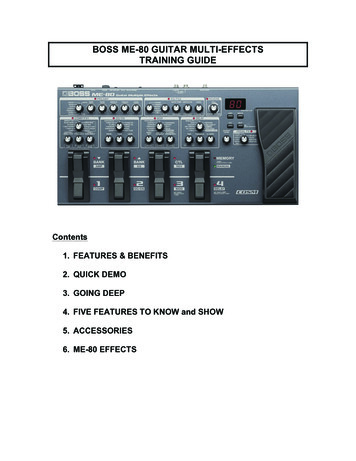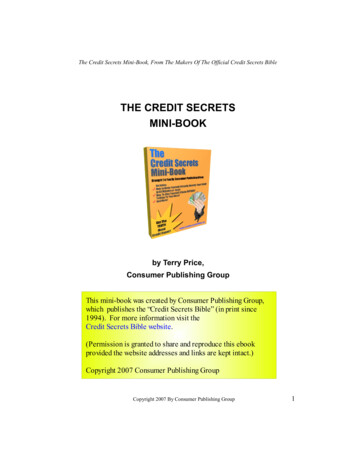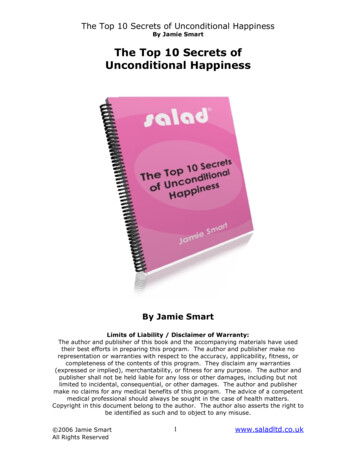
Transcription
CrunchPoint
This page intentionally left blank
CrunchPointThe 21 Secrets to SucceedingWhen It Matters MostBrian TracyAmerican Management AssociationNew York Atlanta Brussels Chicago Mexico City San FranciscoShanghai Tokyo Toronto Washington, D.C.
Special discounts on bulk quantities of AMACOM books areavailable to corporations, professional associations, and otherorganizations. For details, contact Special Sales Department,AMACOM, a division of American Management Association,1601 Broadway, New York, NY 10019.Tel.: 212-903-8316. Fax: 212-903-8083.Website: www. amacombooks.orgThis publication is designed to provide accurate and authoritativeinformation in regard to the subject matter covered. It is sold with theunderstanding that the publisher is not engaged in rendering legal,accounting, or other professional service. If legal advice or other expertassistance is required, the services of a competent professional personshould be sought.Library of Congress Cataloging-in-Publication DataTracy, Brian.Crunch point : the 21 secrets to succeeding when it matters most /Brian Tracy.p. cm.Includes index.ISBN-13: 978-0-8144-7371-9ISBN-10: 0-8144-7371-71. Success in business. 2. Entrepreneurship. I. Title.HF5386.T81413 2007658.4 09—dc222006015404 2007 Brian Tracy.All rights reserved.Printed in the United States of America.This publication may not be reproduced,stored in a retrieval system,or transmitted in whole or in part,in any form or by any means, electronic,mechanical, photocopying, recording, or otherwise,without the prior written permission of AMACOM,a division of American Management Association,1601 Broadway, New York, NY 10019.Printing number10 9 8 7 6 5 4 3 2 1
To those brave men and women, champions of enterprise,builders of families and friendships, risk takers on the turbulent seasof life, who boldly go where no one has gone before, and never giveup. You are the empire builders, the true movers and shakers ofsociety upon whom we all depend. Long may you endure!
This page intentionally left blank
ContentsIntroduction1Chapter 1Stay Calm6Chapter 2Be Confident in Your Abilities11Chapter 3Dare to Go Forward14Chapter 4Get the Facts18Chapter 5Take Control22Chapter 6Cut Your Losses27Chapter 7Manage the Crisis31Chapter 8Communicate Constantly35Chapter 9Identify Your Constraints41Chapter 10 Unleash Your Creativity45Chapter 11 Focus on Key Result Areas50Chapter 12 Concentrate on Priorities55vii
viiiContentsChapter 13 Counterattack!59Chapter 14 Generate Cash Flow63Chapter 15 Care for Your Customers68Chapter 16 Close More Sales74Chapter 17 Keep Things Simple80Chapter 18 Conserve Your Energy88Chapter 19 Make Your Connection94Chapter 20 Character Is King99Chapter 21 Pull It All Together105Index111
CrunchPoint
This page intentionally left blank
Introduction‘‘The obstacles you face are mental barriers that can be brokenby adopting a more positive approach.’’—CLARENCE BLASIERWelcome to Crunch Point. No matter who you are or whatyou are doing, every person and organization experiencesproblems, difficulties, unexpected reversals, and crises that knockyou off balance and must be dealt with right away.It is estimated that every business has a crisis every two tothree months that, if not handled quickly and effectively, canthreaten the very survival of the enterprise. And each person hasa crisis—personal, financial, family, or health—every two or threemonths that can knock you off center as well.But when the going gets tough, the tough get going. It is onlyby facing the challenge of a crunch point that you demonstrate toyourself and others what you are really made of. As the Greekphilosopher Epictetus once said, ‘‘Circumstances do not make theman; they merely reveal him to himself’’ (and to others as well).1
2Crunch PointYour crunch may come in the form of declining sales, reducedrevenue, and low cash flow. You may lose a major customer ormajor sale. You can have unexpected costs or reversals where youlose your entire investment in some part of your business. Peopleinside and outside of your company may turn out to be incompetent or dishonest. You may be lied to, or cheated and betrayedby your friends and colleagues. These sorts of things happen toeveryone.A crunch point may be triggered because a major customergoes broke without paying you, leaving you stranded financially.Your bank could cut off your line of credit. A major source ofrevenue from sales or borrowing could dry up. You could be unexpectedly and unfairly fired and find yourself out on the street.You could have personal problems with your family, finances, orhealth. In each case, you suddenly find yourself against the wall,in a crunch, with your financial or emotional success or survivalin the balance.Responding to ChallengesBetween 1934 and 1961, the historian Arnold Toynbee wrote histwelve-volume series, A Study of History, in which he examinedthe rise and fall of twenty-six civilizations over 3,000 years. Muchof what he discovered in the life cycle of those empires is applicable to the rise and fall of businesses, large and small, and to individuals. The lessons he discovered apply to your personal life aswell.Based on his research, Toynbee developed the ChallengeResponse Theory of History. He found that every civilizationbegan as a small tribe or group of people that was suddenly facedwith a challenge from the outside, usually another hostile groupof people. In business, the equivalent is usually aggressive competition and unexpected reversals in the marketplace.Toynbee found that, in order to respond effectively to thisexternal threat, the leader had to immediately reorganize the tribe
Introduction3or group if it was to survive. If he made the right decisions andtook the right actions, the tribe would rise to the challenge, defeatthe enemy, and in the process, grow and become stronger.But in growing and becoming stronger, the tribe would trigger a confrontation with another, larger hostile force or tribe,thereby creating another challenge. As long as the leader and thetribe continued to rise to and overcome the inevitable challengesconfronting them, they would continue to survive and grow.By continuing to grow through successfully rising to the unavoidable challenges, even a small tribe—like the Mongols, forexample—eventually became a kingdom and then a large civilization, controlling vast lands, treasures, and people.Your Own Personal GrowthWhat Toynbee found in the life cycle of civilizations is also applicable in your personal and business life. From the time you startin business, you will be confronted with problems, difficulties,temporary failures, and challenges of all kinds. They never end.No sooner will you solve one problem than you will be confronted with another, often larger and more complicated.By their very nature, sudden challenges, problems, and crisescome unbidden. They are unwanted, unexpected, and often serious in their implications. They also are unavoidable and inevitable. You can never stop them completely. The only part of thechallenge-response equation that you can control is your response.All that you can determine is how you are going to respond tothe inevitable ups and downs of business and personal life. Yourresponse is under your control.For this reason, your personal level of response-ability determines your survival, success, health, happiness, and prosperity.By responding effectively, you rise to the inevitable challengesyou will face all your life. In learning to respond effectively, youwill continue to grow in knowledge, experience, wisdom, andmaturity. And you will eventually triumph.
4Crunch PointThere’s a saying that ‘‘the North wind made the Vikings.’’The philosopher Friedrich Nietzsche wrote, ‘‘What doesn’tkill me makes me stronger.’’Rising to the ChallengeThe only way that you can realize your full potential, and becomeeverything you are capable of becoming, is by dealing with crunchpoints effectively. The only way that you can achieve all yourgoals is by responding and reacting effectively to the inevitablecrises of day-to-day life.The key to performing at your best during the crunch timesof your life is for you to focus single-mindedly on the solutionsrather than the problems. The more you think about possible solutions, the more solutions will occur to you—and the better theywill be. The more you think about solutions rather than problems,the more positive, focused, and creative you will become. Themore you think in terms of specific actions you can take, the morein control you will be.The most important quality of leadership is the ability tofunction well in a crisis. It can be said that leadership is the abilityto solve problems, of all kinds, including huge problems that arisesuddenly and unexpectedly.Success, too, is the ability to solve problems. The most effective and respected people in every field are those who are themost capable of dealing with the problems that arise in that field.The good news is that you have within you, right now, everything you need to deal with any problem or crisis you face inlife. There is no problem that you cannot solve by applying yourintelligence and creativity to finding the solution. There is no difficulty you cannot resolve by intense concentration. There is noobstacle that you cannot overcome or get around if you are determined and persistent enough.There is a little poem that says:
Introduction5For every problem under the sun,there is a solution or there is none.If there is a solution, go and find it.If there isn’t, never mind it.Your job in crunch time is to rise to the challenge, performeffectively, and continue to move onward and upward. Now, let’smove on to discuss twenty-one ways to perform at your bestwhen you-know-what hits the fan.‘‘I don’t think that there is any other quality so essential tosuccess as the quality of perseverance. It overcomes almosteverything, even nature.’’—JOHN D. ROCKEFELLER
C H A P T E R1Stay Calm‘‘He that would be superior to external influences must firstbecome superior to his own passions.’’—BENJAMIN DISRAELIYou have a wonderful brain with 100 billion cells, more powerful than any supercomputer ever built. Your mind canstore libraries of information throughout your life, which you canaccess through your memory in a couple of seconds. You have allthe intelligence and mental resources you will ever need to dealwith any crunch you ever face.In addition, your thoughts are extraordinarily powerful, withthe ability to make you mad or glad, positive or negative, excitedor calm. The thoughts you think determine the emotions that youexperience. When you find yourself at a crunch point, when youexperience a sudden setback or reversal, your very first job is toseize control of your thoughts and feelings to ensure that youperform at your best.6
Stay Calm7Assert Control ImmediatelyOn the wall of one of my classrooms in school was a poster showing an extremely agitated man. It said, ‘‘When excited or in doubt,run in circles, scream, and shout.’’ Unfortunately, this is whatmany people do in a crunch.The natural tendency when things go wrong is to react oroverreact in a negative way. You may become angry, upset, disappointed, or afraid. These stressful thoughts and negative emotions immediately start to shut down major parts of your brain,including your neocortex, the thinking part of your brain, whichyou use to analyze, assess, and solve problems and make decisions.If you do not immediately and consciously assert mental andemotional control in crunch time, you will automatically resort tothe fight-or-flight reaction. When things go wrong, you will wantto either counterattack or retreat, neither of which may be theright strategy in a crisis situation.Take a Deep BreathThe starting point of staying calm in a crisis is for you to refuseto react automatically and unthinkingly. Instead, take a deep breathto calm your mind and then think carefully about your next wordsand actions.Imagine that everyone is watching. Imagine that this situationis a test to see what you are truly made of. See yourself as a leader;you set the tone for those who look up to you. Imagine that everyone is waiting to see how you will respond. Resolve to set a goodexample, to be a role model for others, to demonstrate the correctway to deal with a major problem, as if you were giving a lesson.The primary source of negative emotions is frustrated expectations. You expected a thing to happen in a particular way andsomething altogether different has happened. You immediatelyrespond in a negative way. This is quite normal. But you mustresist this natural tendency.
8Crunch PointRecognize the Two Biggest EnemiesThe two major forms of negative emotions triggered by a crisis orsetback are the fear of failure and the fear of rejection. Either ofthem can cause anger, depression, or paralysis.You experience the fear of failure when you are threatenedwith the loss of money, customers, position, or reputation, or inthe extreme, the life or well-being of another person. This possibility of failure or loss, especially regarding money, triggers theemotions of anxiety, stress, or even panic.The fear of rejection is closely associated with the fear of criticism or disapproval, or failing to measure up to the expectationsof others. When something goes wrong, you may feel as if youare not capable or competent. You feel embarrassed and deficient.You lose face. Your ego is threatened. These reactions are normaland natural. All that matters, however, is how you deal with thesefears.Remember, your response to the crisis is everything. This is thetest. Instead of overreacting, take a deep breath, relax, and resolveto deal with the problem calmly and effectively.Your Inner Dialogue Determines Your EmotionsPsychologist Martin Seligman has determined that your explanatory style largely determines your thoughts, emotions, and subsequent actions. Your explanatory style is defined as ‘‘the way youexplain things to yourself.’’Fully 95 percent of your emotions, positive or negative, aredetermined by the way you interpret the things that are happening around you, by the way you talk to yourself. If you interpretthe unexpected setback in a constructive way, you will remaincalm and in control.Although your mind can contain thousands of thoughts, itcan hold only one thought at a time, and you are always free tochoose that thought at any given moment. Whatever thought you
Stay Calm9choose at the moment will determine whether you become angryand flustered or remain calm and collected.Remember that most things in life don’t work out, at leastinitially. Remind yourself that problems and difficulties are a normal and natural part of life. They are unavoidable. The only thingyou can control is how you deal with them.Keep yourself calm by refusing to catastrophize. Refuse to interpret the problem as overwhelmingly negative. Very few thingsare ever as bad as they seem initially. The four most importantwords for dealing with any crisis are these: ‘‘This too shall pass.’’Study the Problem Before You RespondInstead of overreacting, keep yourself calm by asking questionsof the other people involved. Listen patiently to the answers. Ifthere is a solution, your job is to find it by fully understandingwhat has happened before you respond.Sometimes, talking over the problem with a spouse or trustedfriend will help immensely to keep you calm and controlled. Gofor a long walk and review the situation, examining it from everyangle, seeking a possible solution. Remain optimistic, no matterwhat is going on. Look for something good in the problem or situation. Very often, what appears to be a major setback is an opportunity in disguise. The complete failure of a project, process, orbusiness venture may be exactly what you need because it maycompel you to channel your time and resources in another direction.Seek the Valuable LessonNo matter what happens, seek the valuable lesson in every difficulty and setback. Within every problem you face, there is theseed of an equal or greater benefit or advantage. When you disciplineyourself to look for the good in the situation, and to seek thevaluable lessons that the situation or crisis might contain, you
Crunch Point10automatically remain calm, positive, and optimistic. As a result,all the powers of your wonderful mind remain available to youto solve the problem or resolve the crisis.When you face crunch time, take a few minutes to close youreyes, breath deeply, and visualize yourself as calm, confident, relaxed, and in complete control. Resolve to be positive and optimistic around other people. Speak kindly and courteously. Act asif you don’t have a care in the world, and that whatever has happened, it is not really bothering you at all.Crunch Point Actions1. Look into any problem or crisis you are facing for something good, a benefit of some kind. Often your biggest problemis an opportunity in disguise.2. Seek the valuable lesson in every setback or difficulty.Imagine that your problem has been sent to you at this time toteach you something you need to know to be more successful andhappy in the future.‘‘Never give up then, for that is just the place and time that thetide will turn.’’—HARRIET BEECHER STOWE
C H A P T E R2Be Confident inYour Abilities‘‘Courage is the price that life extracts for granting peace.’’—AMELIA EARHARTAmajor setback can shake your confidence in yourself andyour abilities. The natural reaction to an unexpected reversal of fortune is to feel stunned, shocked, and angry, as if youhave just been punched in the emotional solar plexus. This response is normal and natural for all of us when we experiencesudden reversals and disappointments.No matter what happens, remind yourself that you are a thoroughly good person. You are a person of character, competence,and intelligence. No matter what has happened, you have theability to rise to the challenge and deal with the situation.Talk to yourself positively in order to rebuild your selfconfidence. Say things like, ‘‘I like myself! I like myself! I likemyself!’’11
Crunch Point12You Can Do It!Whenever something goes seriously wrong, you experience thefear of failure. You immediately feel this fear in the pit of yourstomach. You may feel that you are not capable or competent.Sometimes, you feel like a loser. When things go wrong, in spiteof your best efforts, you will often have feelings of self-doubt.Fortunately, you can neutralize these negative feelings by saying firmly to yourself, ‘‘I can do it! I can do it! I can do it!’’Tell yourself that you can do anything that you put your mindto. Tell yourself that there is no problem that you cannot solve.Look upon solving the problem or resolving the crisis as a test ofyour character and intelligence. See it as a challenge, somethingthat has been sent to help you to grow in knowledge and wisdom.The Worry-Buster FormulaOne of the very best ways to clear your mind and build yourconfidence in your ability to solve the problem is to quickly usethe four-part worry-buster formula. Here it is:1. Stop and identify the worst possible outcome of the problem or crisis. Be perfectly honest with yourself and others.Ask, ‘‘What is the worst thing that can happen in thissituation?’’2. Resolve to accept the worst, whatever it is, should it occur.This action calms you down and clears your mind. Onceyou have mentally decided that you can live with theworst possible outcome, you will stop worrying.3. Determine what you would do if the worst possible outcome occurred. What actions would you take?4. Begin immediately to improve upon the worst possibleoutcome. Identify everything you could do to minimizethe damage or reduce your losses. Focus all your time andattention on achieving the very best outcome you possiblycan.
Be Confident in Your Abilities13The Antidote to WorryThe only real antidote to worry is purposeful action in the directionof your goals. Instead of becoming upset or doubting yourselfand your abilities, decide to take action, any action, to resolve thedifficulty and get yourself through the crunch. Remind yourselfthat problems come not to obstruct, but to instruct.Especially, don’t take the setback or problem personally. Inbusiness, no matter how smart or experienced you are, 70 percentof your decisions will turn out to be wrong or disappointing inthe fullness of time. Don’t be surprised or upset when negativethings happen to you. They happen to everyone who goes intobusiness or accepts a position of responsibility in any organization. As they say, ‘‘Problems go with the territory.’’Self-confidence comes from a feeling of forward motion towardyour goals. Get so busy working on the solutions to your problems that you don’t have time to worry about what has happened,especially things that you cannot change.Crunch Point Actions1. Take purposeful action immediately to deal with yourproblem. Do something. Do anything, but step forward boldly totake charge and minimize the damage.2. Refuse to feel sorry for yourself or lash out at someoneelse. Problems are a normal and natural part of a busy life. Instead, accept responsibility for the situation and focus on the solution.‘‘The universal line of distinction between the strong and theweak is that one persists, the other hesitates, falters, trifles,and at last collapses or ‘caves in.’ ’’—EDWIN PERCY WHIPPLE
C H A P T E R3Dare to Go Forward‘‘Courage is contagious. When a brave man takes a stand,the spines of others are often stiffened.’’—BILLY GRAHAMWhen your business hits a crunch point, you must makethe survival of your company your primary consideration.Desperate situations often require desperate measures. You mustbe prepared to do whatever is necessary to resolve the crisis andsave the situation.The most common quality of leaders throughout the ages istheir quality of vision. Leaders have a clear, exciting vision ofwhere they want to go and what they want to accomplish in thefuture. They articulate this vision clearly to the people aroundthem. This vision then serves as a guide to motivate and inspirepeople to achieve at ever-higher levels. Vision is what separatesleaders from followers.The second most common quality of leaders is courage. Win14
Dare to Go Forward15ston Churchill wrote that ‘‘courage is rightly considered the foremost of the virtues, for upon it all others depend.’’Everyone Is AfraidThe fact is that everyone is afraid. We all have fears of differentkinds, small and large, hidden and exposed. Mark Twain said,‘‘Courage is not lack of fear, but control of fear, mastery of fear.’’In crunch time, you must draw on your courage to make hardchoices and decisions and to do the things necessary to ensurethe survival and well-being of the people and the organizationthat depend on you.The worst effect of the fear of failure is that it can cause paralysis. People go into a state of emotional shock, like a deer caughtin the headlights. They freeze up. The fear of failure can causeeven strong people to become indecisive and irresolute.Do the Thing You FearRalph Waldo Emerson once wrote, ‘‘If you would become a success, you must resolve to confront your fears. If you do the thingyou fear, the death of fear is certain.’’You develop courage in yourself by facing your fears anddoing the things that you are most afraid to do. In business, thegreatest fear (after the fears of firing someone or being fired, andfinancial loss or bankruptcy) is the fear of confrontation. Manypeople are afraid to make hard choices and deal with people ina clear, unequivocal, and straightforward way. They fear angryresponses, argument, and conflict. This inability to confront people both inside and outside of the business can often be fatal tothe enterprise.Fortunately, courage can be developed by acting courageously.When you do something that you fear, you feel more courageous.In life, the courage follows the courageous behavior. You becomecourageous by acting courageously, even when you do not feel
16Crunch Pointlike it. Emerson also wrote, ‘‘Do the thing and you will have thepower.’’ Don’t be afraid to make hard decisions, especially withregard to people and expenses.Go into Crisis ModeWhen your business experiences a sudden crisis, you must gointo ‘‘crisis mode.’’ You must act as though your business were onthe verge of failure.If you were threatened with bankruptcy, what actions or cutbacks would you make to save your business? Whatever youwould be prepared to do to save your business sometime in thefuture, do it immediately. Don’t delay.Be aggressive about defending and protecting your businessand your finances. Don’t be afraid to discontinue, downsize, oreliminate any business activity. If necessary, don’t hesitate to layoff or fire people who are either unnecessary or incompetent. Thefear of firing an incompetent employee in a key position is amajor reason for business failure.The author Dorothea Brande once wrote that the most important advice she ever received was to ‘‘act as if it were impossibleto fail, and it shall be.’’The Two Parts of CourageThere are two parts of courage. The first is the courage to launch,to begin, to step out in faith with no guarantee of success. This isan essential part of courage that you can develop with practice.The second is the courage to endure, to persist in the face of disappointment and temporary failure.Your job in business is to develop the courage to do whateveris necessary to fight the fire, solve the problem, and get throughthe crunch. This is the hallmark and the test of true leadership.
Dare to Go Forward17Crunch Point Actions1. Identify some person, situation, or action that you fear;resolve to confront it immediately and get it behind you.2. Whatever decisions you would make if your survival wasat stake, make them now. As Shakespeare wrote, ‘‘Take actionagainst a sea of troubles, and in so doing, end them.’’‘‘Some men give up their designs when they have almostreached the goal while others obtain a victory by exerting, atthe last moment, more vigorous efforts than ever before’’—HERODOTUS
C H A P T E R4Get the Facts‘‘The greatest test of courage is to bear defeatwithout losing heart.’’—ROBERT INGERSOLLPerhaps the number-one reason for success in life is clarity—about who you are, what you want, and the details of thesituation you are facing. The more and better information youhave regarding the exact nature of the crunch that you are dealingwith, the calmer you will be and the better the decisions you willmake.Jack Welch, the former president of General Electric and perhaps the top executive in the world in his time, said that the mostimportant of all leadership principles is what he called the ‘‘Reality Principle.’’ He defined the Reality Principle as ‘‘facing theworld as it is, rather than as you wish it would be.’’ WheneverWelch would go into a problem-solving meeting at General Electric, his first question would always be, ‘‘What’s the reality?’’18
Get the Facts19Facts Don’t LieHarold Geneen, who built ITT into a 150-company internationalconglomerate, often said that the most critical element in solvingproblems and making good decisions in business was to ‘‘get thefacts!’’You must get the real facts, the true facts, not the alleged facts,the assumed facts, the hoped-for facts, or the imagined facts. Getthe real facts and make your decisions based on them. As Geneenexplained, ‘‘Facts don’t lie.’’Whenever you face crunch time in your life or business, mentally call a time-out in the game and focus on getting all the information you can about the situation before you make a decisionor overreact.Ask the Right QuestionsAsk key questions and listen carefully to the answers. Here aresome that will help you get at the facts: What is the situation exactly? What has happened? How did it happen? When did it happen? Where did it happen? What are the facts? How do we know that these facts are accurate? Who was involved? Who is responsible for doing (or not doing) certain things?The very act of asking questions and gathering facts keepsyou calm and increases your courage and confidence. The morefacts you have, the stronger and more capable you will feel aboutmaking good decisions to solve the problem and get through thecrunch.
Crunch Point20Remind yourself that ‘‘what cannot be cured must be endured.’’ If something has happened, if it is a past event that cannot be changed, it becomes a fact. Never worry or become upsetabout a fact, which is something that you cannot change. Focuson what you can do, not on what you cannot do.Dig Deeper for More ClarityEspecially during the fact-finding process, resist the temptationto become angry or to blame others for their mistakes and shortcomings. This is not the time or the place, if there ever is a righttime or place for blaming. Focus instead on getting the facts, understanding the situation, and determining the specific actionsyou can take.This means finding the answers to even more questions, againto achieve clarity. Two of the best questions you can ask in anycrisis situation are, ‘‘What are we trying to do?’’ and ‘‘How arewe trying to do it?’’Never assume that you have all the information, or that theinformation you have is correct. The more important a particularfact is to your decision making, the more essential it is that youcheck and double-check to be sure that it is true. Dig deeper byasking: What are our assumptions in this situation? What if our assumptions were wrong? If we were wrong with one of our major assumptions,what would that mean? What would we have to do differently?Correlation vs. CausationFinally, in achieving absolute clarity about your situation, do notconfuse correlation with causation. The natural tendency of mostpeople is to jump to conclusions too quickly. In many cases, when
Get the Facts21two events happen at
Point The 21 Secrets to Succeeding When It Matters Most Brian Tracy American Management Association New York Atlanta Brussels Chicago Mexico City Sa










